- Home
- J. A. Konrath
Shot Girl Page 13
Shot Girl Read online
Page 13
Totes serious.
Then I had to wait for about ten minutes, b4 a different guard told me that Tully had visitation privileges restricted, and I’d only get to see him in a No Contact room.
Sux.
I brought the change bcuz I wanted to share a soda with the dude and buy him a candy bar.
Next time.
The guard led me through a series of hallways and security doors, and then told me to wait in Box 6. I opened the door, and saw a chair and a big glass window, and an old-fashioned phone on the wall, like in the movies. Room smelled like lemon bleach. Tully wasn’t there yet, so I sat down and waited.
#NotScary.
I spent a lot of time thinking about my spree, and even with all my planning, I knew there was a possibility I could get killed, or captured.
Death didn’t scare me. Death was just death. Like sleep without dreams. I wasn’t a little baby who believed in God or the devil or hell or nothing. If I got killed, no biggie.
But I didn’t have any 4sure feelings about prison, bcuz I didn’t know what to expect.
So far, I wasn’t afraid. So far, it was like going to the DMV.
Being locked up was one of the things I wanted to ask Tully about.
A few minutes passed, and then a guard brought in a man wearing prison stripes, his hands cuffed, a chain extending down to ankle cuffs.
I felt a twinge.
Tully Huffland didn’t look as big as he did in Internet clips. He also looked a lot older. Barely an adult when he and Gregory Taylor Schneider became the Suburban Eliminators and caused the Rathlin High School Massacre of 2009, he now appeared ancient, like forty years old, with a receding hairline and sunken eyes and a tattoo on his cheek of the number 24.
He sat across from me and stared like a zombie, then picked up his phone.
I did the same.
“You’re Gaff. Kid that wrote to me.”
I nodded, and for a moment I forgot my list of questions, forgot my list of how to act around people. Routine eventually kicked in, and I said, “Hey, Tully. How you doing?”
“Restricted privileges for two months. Some asshole got touchy feely, and I shanked him in the kidney.”
Cool.
“What’s it like, being inside?”
“It’s like Disneyland. They got all these rides and attractions, and all the drugs you want, and free whores to suck you off.”
That didn’t sound right. He was probably being sarcastic.
“You look good.”
“You sweet on me, Gaff?”
I shook my head. “Just saying you been locked up ten years. You’re keeping it tight.”
He nodded, then adjusted in his chair, his posture relaxing a little.
“Prison’s a’ight. I get by. Miss the pussy. Miss the outside. But it’s bearable. Dude can get by, know what I’m saying?”
I didn’t really know what he was saying, but I think he confirmed my beliefs. I could handle prison, if it came to that.
We stared @ each other for a little bit.
“You’re thinking about it,” he said.
I shook my head. “Done thinking. I’m doing it.”
After a pause he said, “School?”
“Lots of schools have metal detectors now, thanks to you and Gregory.”
Hard to tell, but he seemed to appreciate that. “What’s your plan?”
Tully Huffland was probably the only living person that I felt any kind of respect for, but telling him my plan would be stupid. Every time I trusted someone, I got burned. Tell doctors my feelings, and they put me on whack meds. Tell Moms what’s on my mind when she asks, and she freaks out.
“You get TV in here?” I asked him.
“Yeah.”
“You’ll see,” I said. “Tomorrow.”
He smirked. The smile vanished as quick as it came. “You ever kill anyone, Gaff?”
I shook my head.
“Ever shoot a gun?”
Another head shake. “Just bought one.” That made me remember one of my questions. “What’s it feel like?”
Tully sat up a little straighter, and he seemed to get bigger all over. “It’s loud. Louder than you think. Gotta wear earplugs. Eye protection, too. And it hurts your hands after you fire off a bunch. Makes you feel like you’re in a movie or a videogame, know what I’m saying? That kind of rush.”
I didn’t get a rush from movies or videogames, but I nodded bcuz that seemed right.
“How about the rest?” I asked.
“What’s it feel like to kill someone?”
I nodded.
Another smirk. “I can’t describe it. When you do it, you’ll know. It’s like a new part of you opens up, shows you who you really are. Know what I’m saying?”
I waited for more. More came.
“I can tell you this, Gaff. I been in this shithole for ten years. There’s stuff to do. TV. Music. Games. Weights. You can read, if you’re into that shit. You can even get drugs and booze, and get your willy sucked. But the thing I like most is closing my eyes and… remembering.”
I wondered what that felt like. I remembered a lot of my life, but didn’t like any of it.
It would be high key to remember something I actually liked.
“So it’s worth it?”
“Hells yeah it’s worth it. I envy you, Gaff. And I don’t regret shit. You know what this is?”
He held the phone receiver to his cheek, pointing @ his tattoo. I nodded, and he put the phone back to his ear.
“Twenty-four victims,” I said.
“Twenty-four life sentences,” he corrected me. “But I can still get parole. Might take another forty years, but my lawyer said it’s possible. One of the things the parole board will ask, is if I’m sorry about what I did. If I regret it. And they’ll ask what I want to do when I get out. You know what I’m gonna tell them assholes? That killing those people was the best thing I ever done in my life, and if they let me out I’d do it again in a heartbeat, no questions asked. You know what I’m saying?”
I think I did know what he was saying. I nodded.
A guard came for him, and he smiled @ me. “Good to meet your acquaintance, Gaff. Come back and see me again when I’m off restrictions. I’d be proud to shake your hand.”
He hung up and shuffled away.
Fire.
On the way home from prison I stopped @ the supermarket again.
For earplugs.
I also bought some plastic shooting glasses, tinted yellow to reduce glare, a pack of fifty latex gloves.
Gotta have protection, yo.
“In Chicago, which has the toughest gun laws in the United States, probably you could say by far, they have more gun violence than any other city. So we have the toughest laws, and you have tremendous gun violence.”
DONALD TRUMP
“You can’t put a gun in the hands of someone who represents a danger to themselves or society.”
THOM TILLIS
JACK
I pushed away the rest of my chili mac and let out a slow breath.
Mrs. Shadid wanted to resume our conversation.
I did not.
But when was the last time I got what I wanted?
“Studies have shown that when there are fewer guns available, there are fewer gun deaths,” she said. “Look at Australia.”
In 1995, after a spree shooting, Australia passed the National Firearms Agreement law. It put severe restrictions on firearm ownership, created a national firearm registry, and the government bought back almost 700,000 firearms from citizens.
“The NFA significantly lowered the firearm homicide rate in Australia,” I said. “But some studies have shown the overall homicide rate wasn’t affected. People kill each other at the same speed. They just found other ways to do it.”
“I read that it eliminated mass shootings.”
“There’s no way to be sure the NFA directly influenced mass shootings. Remember that spree shooting isn’t a gun problem. It�
�s a mental health problem. In Japan, where guns are scarce, people with that same mentality go on stabbing sprees.”
Mrs. Shadid scowled. “You’re diverting. You know you can do a lot more damage with a gun than a knife.”
“True. But to play devil’s advocate, if we take away all guns, what’s to stop a disturbed student from stockpiling kerosene and burning down his high school? Do we ban all fossil fuels?”
Which, honestly, I wouldn’t object to, considering how oil has screwed our planet and been responsible for countless wars and deaths.
“You keep being provocative, Jill. And going way off the subject.”
“Trying to keep things lively.”
“Or trying to veer away from the main point. Knives and fossil fuels have specific purposes that don’t involve harming others. Guns have a single purpose; to hurt people.”
“I’ll disagree there, Mrs. Shadid.”
“Please, call me Sowa. Let’s go back to the Australia law. Wouldn’t a US government buyback program eliminate a lot of the guns?”
I eyed her pizza, then picked at my chili mac, raising a lukewarm, bland forkful to my mouth.
“Some. Maybe. In Australia, a lot of people sold broken, unworking firearms back to the government. But do you think a gangbanger, who uses a gun to protect himself from rivals, is going to sell his firearm to anyone, ever? Or the millions of Americans who hunt for sport? Or hunt to eat? Or shoot recreationally? And even if there was a buyback program, we’d have no idea if it had an effect.”
“Why not?”
“No one knows for sure how many guns there are in the USA. Three hundred million is an agreed upon estimate, but no one keeps track.”
“That doesn’t make any sense.”
Actually, it did.
“I’ve heard it said that there are only two reasons why the government would want to keep tabs on gun ownership. To tax them, and to take them away.”
Sowa nibbled her pizza. “Sounds like more paranoia.”
“Maybe. But every year we need to buy a new license plate sticker. No one likes it. Every year we have to pay property tax on land we own. No one likes it. And since the average gun owner has more than eight firearms, good luck passing a law that registers firearms. Plus, there’s the privacy issue. Do you want the government to know everything about you?”
“If you have nothing to hide, who cares if the government knows?”
This was an easy argument to defuse. “Would you like cameras in your house, recording and broadcasting every single thing you do, twenty-four hours a day? Every private moment? Every conversation?”
“Of course not.”
“Then you believe a person deserves privacy. We’re just arguing over how much privacy.”
I pushed my plate away again and studied the room.
A man had entered that I’d missed during my last scan. Thirties, wearing sunglasses indoors, and an ankle-length duster jacket with all sorts of bulges in it.
My threat level kicked up to yellow, and I felt more uneasy about this guy than I did that teen earlier in the day. I considered my .38, under my seat. Locked and unloaded. I’d practiced, and it took me twelve seconds to get my revolver in hand, loaded, ready to fire.
If this guy had an automatic weapon with a large magazine, he could kill all twenty-two people in the cafeteria before I even got my trigger lock off.
“So you think everything is okay with guns in the USA?” Sowa asked.
“What? No. I think everything is messed up.”
“What’s the solution? Arming everyone?”
I shook my head. “The more guns there are, the more gun deaths there are going to be. That will always be the case with anything. More cars, more car accidents. More skyscrapers, more ice falling off the sides of buildings and killing pedestrians. More hamburgers, more people choking to death on hamburgers.”
“So let’s restrict guns. Ban all new guns from being manufactured or imported into the US. Supply and demand will make the costs of guns skyrocket, out of the hands of criminals.”
“And out of the hands of law-abiding citizens. Remember, there are more lawful gun owners than there are criminals with guns, by a large percentage. Besides, prohibition doesn’t work. Look at the War on Drugs. Trillions of dollars spent, and drug use is as widespread as ever. When the regular market doesn’t provide, the black market will.”
The guy in the duster had wandered over to the buffet line, staring at donuts through the sneeze shield. His long coat was still closed.
“You’re doing it again. Objecting to a good idea because it won’t solve everything. If that’s your attitude, why do anything? Seatbelts and airbags don’t save all lives, so why force auto manufacturers to equip them?”
“Fair enough. Let’s consider your idea. No more guns made in the USA, no more guns imported. We still have over 300,000,000 guns that already exist in America, which will still be bought and sold and traded and passed along.”
“So that’s a reason to not restrict gun sales? The laws of supply and demand state that those guns will become more expensive and harder for criminals to get.”
“If a criminal wants a gun, he’ll find a gun. New guns will be smuggled in from other countries. Guns will be created on 3D printers. Or maybe guns will be replaced by something else. Muggers with sulphuric acid. Homemade bombs. Chainsaws. There will always be people that want to harm others, and they’ll always find a way.”
I knew that all too well.
“You’re back to saying we shouldn’t do anything because nothing will fix everything.”
“I understand your argument, Sowa. I’m not saying that. Something needs to be done. There will never be a solution that solves America’s gun problem. But I believe legal firearm ownership can be regulated much better than it is now.”
She leaned in closer. “How so?”
“In the case of firearms, people should be required to pass a test and get a license the same way they need a license to drive a car. The laws on the books need to be enforced. Guns should be registered, and every transaction should require a background check. In the case of two private sellers, they should still go through a licensed firearm dealer, and there should still be a waiting period between purchase and delivery. Gun manufactures should be required to disclose how many guns they’ve sold. Gun safety should be taught in schools.”
Mrs. Shadid chortled. “You want to give children guns? That’s insane.”
“You’re saying it’s okay to put a sixteen-year-old behind the wheel of a one ton vehicle that goes a hundred miles per hour, but it isn’t okay to teach one how to handle a gun?”
“Teaching gun safety just encourages gun ownership.”
“If it’s good people owning guns, how is that bad?”
“It would also teach bad people about guns.”
“The bad people learn anyway,” I said. “They seek guns out. And they use them against good people. It isn’t a coincidence that most active shooting situations happen in gun free zones. If a mugger, or rapist, suspects that a possible victim is armed, will they risk going through with the assault? What if it was something as simple as a red bandana that reads I’M ARMED? If that even became somewhat widespread, it wouldn’t matter if the person was armed or not. They’d be avoided by predators.”
The duster guy began to stride quickly across the room, and I was surprised enough to reach for my compartment under my seat just as I saw the smile on his face as he embraced an older, shorter version of himself while semi-shouting, “Dad!”
Here to visit his father. Which was more than I’d done in quite some time.
My threat level dropped back to green.
“How about suicides?” Sowa asked. “More guns means more people killing themselves.”
“Actually, it means more people killing themselves with guns. In Australia, gun suicides plummeted after the National Firearms Agreement. But other types of suicide, like hangings, rose in direct proportion. At least, accordi
ng to one study. Another study refutes it.”
Sowa pushed her half-eaten pizza away. “I’ve seen that same problem. One article says one thing, another says the opposite.”
“The problem with most studies is bias. Those who fund these research projects often have agendas. We pass laws in this country based on big business and moral outrage and the corruption in our political system. We should be using science and facts. But that’s less likelier to happen than the gun problem being solved. We’re not a country of logic and common sense. We’re a country of superstition and fear and envy.”
“And the almighty dollar.”
“Agreed. We can blame capitalism and big business for our gun problem as much as we can blame our lawmakers, and we need to blame ourselves, for voting those politicians into office.”
“Because guns make money.”
I nodded. “A lot of money. Billions of dollars.”
“And not just for the gun companies. For all the places that sell guns, too. Like department stores. You can pick up a pair of sandals, a case of soda, and a semi-automatic rifle with a high capacity magazine and enough ammunition to kill dozens.”
That seemed oddly specific, and then Sowa began to shake, and I realized where she was going with this. I reached for her hand, covering it with mine.
“That’s what he bought,” she said, voice cracking. “Richard Thomas Malkoveck. Shoes, soft drinks, a gun, and bullets. The store did a background check. He was a convicted felon, but the purchase still went through. The FBI called it an administrative error. An hour later, he came to our place of worship and killed my husband, my daughter, my son-in-law, and my fourteen-year-old granddaughter.”
I answered honestly. “I can’t imagine your pain, Sowa.”
Her eyes went someplace faraway. Someplace horrible. “When the shooting began, none of us knew what was happening. It was so loud, but I thought it was a string of firecrackers. In a mosque… the last thing you expect…”
She choked up, and I squeezed her hand. It felt like holding my Mother’s.
“He looked so calm, Jill. He walked toward us, shooting, shooting my friends and family and people in my community, he walked toward us and looked so utterly calm. Like we weren’t people. Like we were a nest of rats he needed to exterminate.”

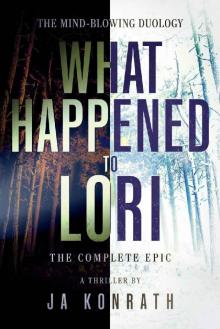 What Happened to Lori
What Happened to Lori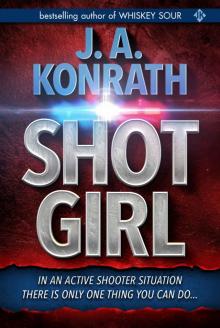 Shot Girl
Shot Girl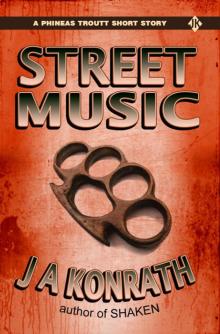 Street Music
Street Music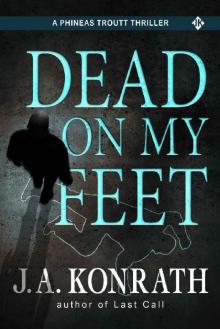 Dead on My Feet
Dead on My Feet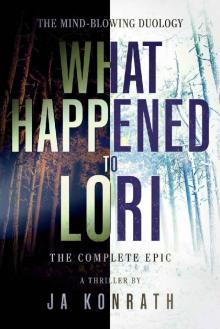 What Happened To Lori - The Complete Epic (The Konrath Dark Thriller Collective Book 9)
What Happened To Lori - The Complete Epic (The Konrath Dark Thriller Collective Book 9)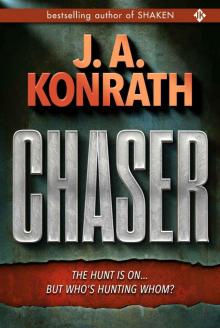 Chaser
Chaser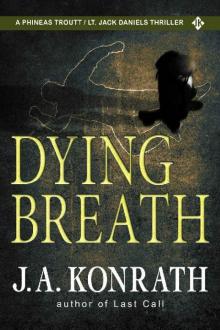 Dying Breath - A Thriller (Phineas Troutt Mysteries Book 2)
Dying Breath - A Thriller (Phineas Troutt Mysteries Book 2)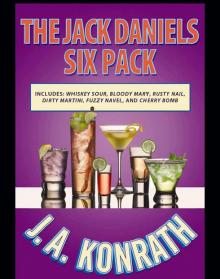 Jack Daniels Six Pack
Jack Daniels Six Pack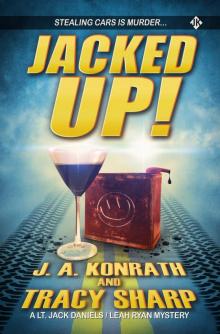 Jacked Up! (A Lt. Jack Daniels/Leah Ryan Mystery)
Jacked Up! (A Lt. Jack Daniels/Leah Ryan Mystery)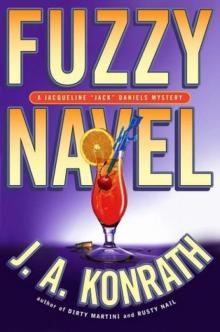 Fuzzy Navel
Fuzzy Navel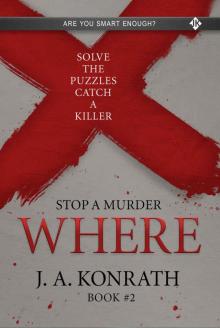 STOP A MURDER - WHERE (Mystery Puzzle Book 2)
STOP A MURDER - WHERE (Mystery Puzzle Book 2)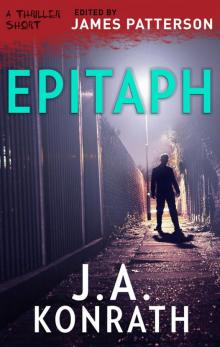 Epitaph
Epitaph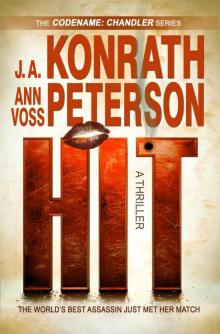 Hit: A Thriller (The Codename: Chandler)
Hit: A Thriller (The Codename: Chandler)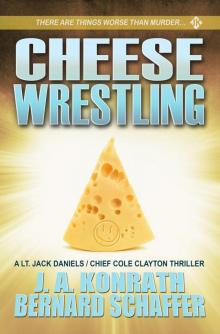 Cheese Wrestling: A Lt. Jack Daniels/Chief Cole Clayton Thriller
Cheese Wrestling: A Lt. Jack Daniels/Chief Cole Clayton Thriller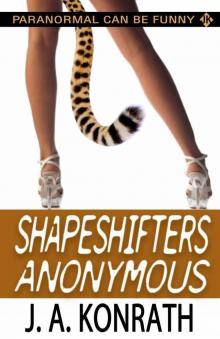 Shapeshifters Anonymous
Shapeshifters Anonymous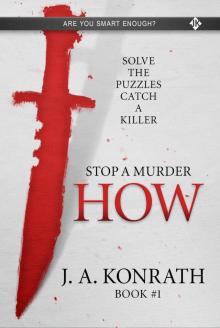 STOP A MURDER - HOW (Mystery Puzzle Book 1)
STOP A MURDER - HOW (Mystery Puzzle Book 1)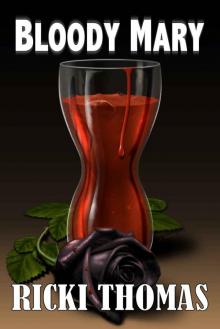 Bloody Mary
Bloody Mary Dying Breath
Dying Breath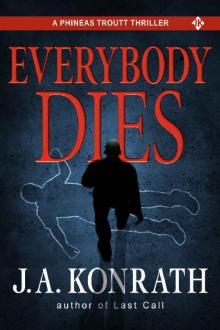 Everybody Dies - A Thriller (Phineas Troutt Mysteries Book 3)
Everybody Dies - A Thriller (Phineas Troutt Mysteries Book 3) DRACULAS (A Novel of Terror)
DRACULAS (A Novel of Terror)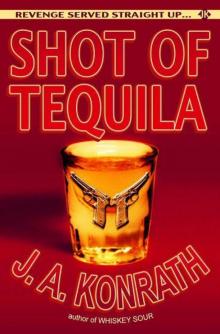 Shot of Tequila
Shot of Tequila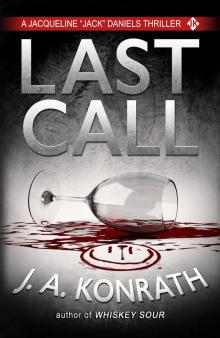 Last Call - A Thriller (Jacqueline Jack Daniels Mysteries Book 10)
Last Call - A Thriller (Jacqueline Jack Daniels Mysteries Book 10)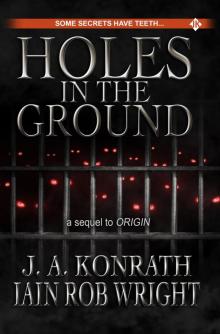 Holes in the Ground
Holes in the Ground![Shaken [JD 07] Read online](http://i1.bookreadfree.com/i1/04/01/shaken_jd_07_preview.jpg) Shaken [JD 07]
Shaken [JD 07]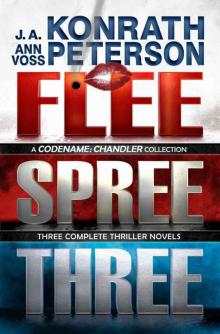 Flee, Spree, Three (Codename: Chandler Trilogy - Three Complete Novels)
Flee, Spree, Three (Codename: Chandler Trilogy - Three Complete Novels)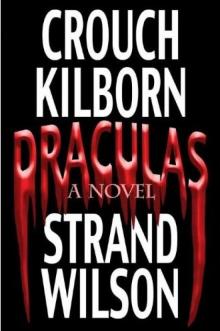 Draculas
Draculas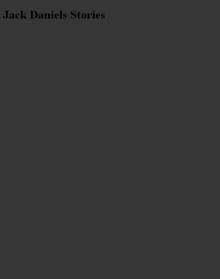 Jack Daniels Stories
Jack Daniels Stories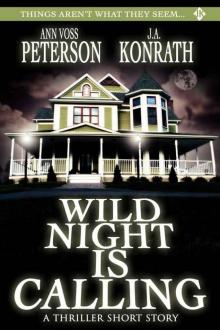 Wild Night is Calling
Wild Night is Calling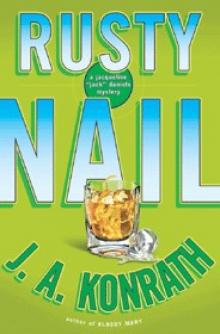 Rusty Nail
Rusty Nail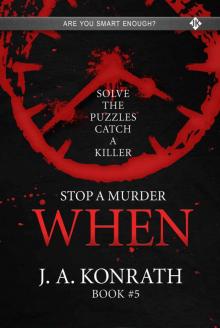 STOP A MURDER - WHEN (Mystery Puzzle Book 5)
STOP A MURDER - WHEN (Mystery Puzzle Book 5)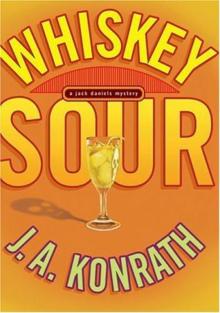 Whiskey Sour
Whiskey Sour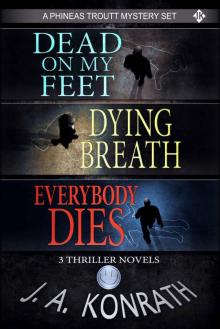 Phineas Troutt Series - Three Thriller Novels (Dead On My Feet #1, Dying Breath #2, Everybody Dies #3)
Phineas Troutt Series - Three Thriller Novels (Dead On My Feet #1, Dying Breath #2, Everybody Dies #3)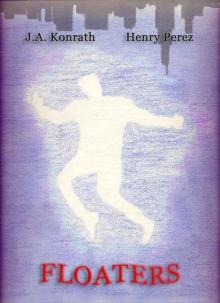 Floaters - A Jack Daniels/Alex Chapa Mystery
Floaters - A Jack Daniels/Alex Chapa Mystery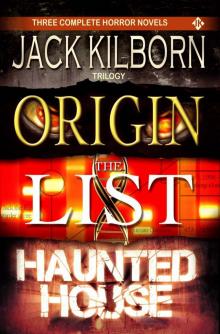 J.A. Konrath / Jack Kilborn Trilogy - Three Scary Thriller Novels (Origin, The List, Haunted House)
J.A. Konrath / Jack Kilborn Trilogy - Three Scary Thriller Novels (Origin, The List, Haunted House)![Shaken (Jacqueline Jack Daniels Mysteries) [Plus Bonus Content] Read online](http://i1.bookreadfree.com/i2/04/10/shaken_jacqueline_jack_daniels_mysteries_plus_bonus_content_preview.jpg) Shaken (Jacqueline Jack Daniels Mysteries) [Plus Bonus Content]
Shaken (Jacqueline Jack Daniels Mysteries) [Plus Bonus Content]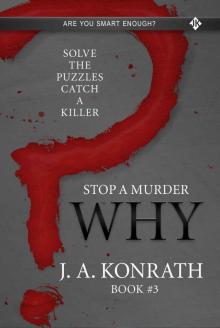 STOP A MURDER - WHY (Mystery Puzzle Book 3)
STOP A MURDER - WHY (Mystery Puzzle Book 3)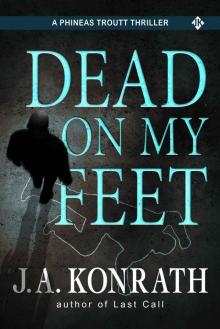 Dead On My Feet - A Thriller (Phineas Troutt Mysteries Book 1)
Dead On My Feet - A Thriller (Phineas Troutt Mysteries Book 1)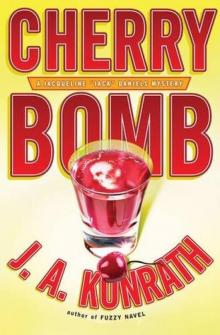 Cherry Bomb
Cherry Bomb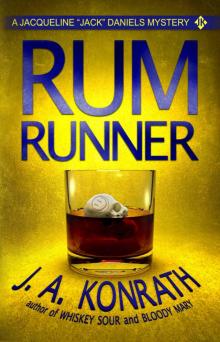 Rum Runner - A Thriller (Jacqueline Jack Daniels Mysteries Book 9)
Rum Runner - A Thriller (Jacqueline Jack Daniels Mysteries Book 9)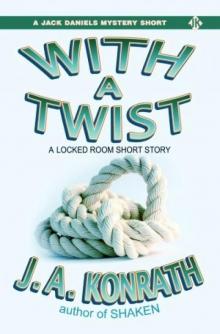 With a Twist
With a Twist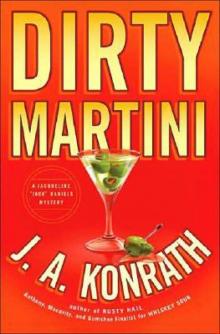 Dirty Martini
Dirty Martini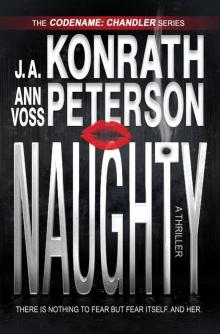 Naughty
Naughty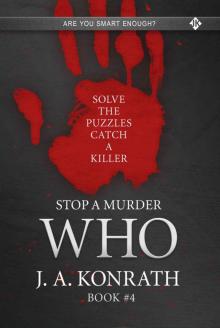 STOP A MURDER - WHO (Mystery Puzzle Book 4)
STOP A MURDER - WHO (Mystery Puzzle Book 4)